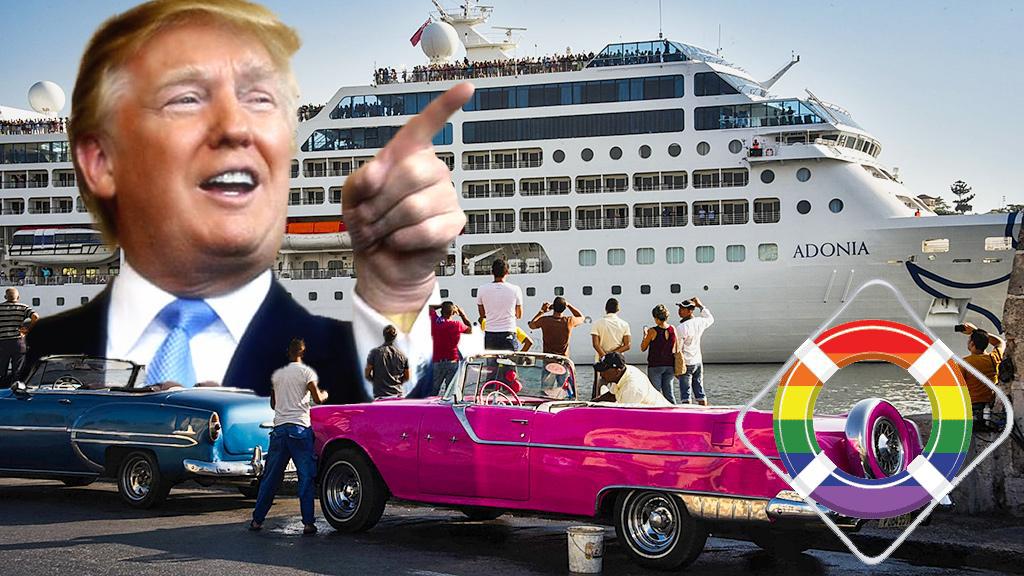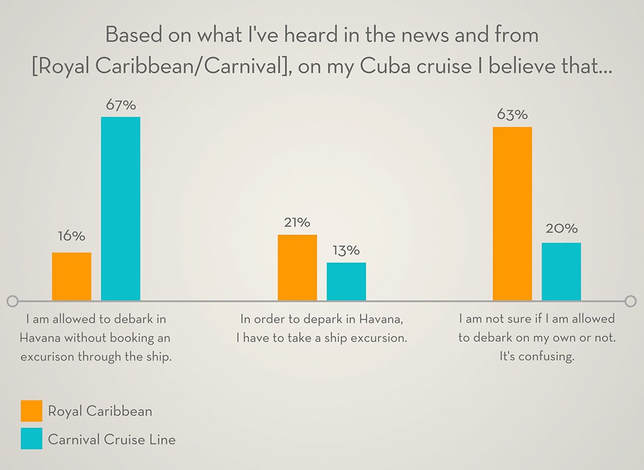Guest blog for MeetMeOnBoard.comPresident Trump declared on Friday that he will be “canceling the last administration’s completely one-sided deal” with Cuba. According to Trump, Obama’s “easing of restrictions of travel and trade does not help the Cuban people. They only enrich the Cuban regime.” I worked as a tour guide on the inaugural round of Fathom Cuba sailings last year. I’m only speaking from my first-hand boots-on-the-ground experience with the responsibility of upholding the Obama-era travel policy. For me, that meant making sure every passenger signed an affidavit before they disembarked the ship in Cuba. They needed to declare whether they would:
If passengers elected to be fully or partially self-guided, they opted out of the ship excursion, but still had the US government’s permission to tour Cuba on their own, as long as they kept a journal or log of the day’s events. It may sound simple here, but explaining this to cruise passengers was sometimes complicated. For example, here is one frequently asked question and my response: Am I allowed to go to the beach? Yes and no. No one from the ship will stop a passenger from going to the beach, but technically, it must be for P2P travel. For example, if you go the beach, drink a mojito, and sunbathe, that is considered touristic travel and therefore not allowed. If you go to the beach, and, for example, take a Spanish class or have meaningful conversations with the Cubans around you, that is allowed. Whatever happens at the beach, make sure you write it down in a journal that the US government may or may not ask you for five years from now. As you can see, the line between what is or isn’t P2P is kind of blurry. Even if a passenger went on a certified excursion organized by the ship, there was always the possibility that they could spend the whole day on a bus and never speak to a Cuban other than their tour guide. Yet, it still seemed that everyone was allowed off the ship to tour Cuba as they pleased. So what exactly has changed?Under the new policy, self-directed individual travel, which was permitted by the Obama administration, will be prohibited (see 2 and 3 from above). President Trump instructed the Treasury to issue regulations ending individual people-to-people travel. This means prohibiting travel that: “does not involve academic study pursuant to a degree program” and does not have “an employee, consultant, or agent… [accompanying] each group to ensure that each traveler maintains a full-time schedule of educational exchange activities.” US tourists flying to Cuba can manuever around this regulation. They can go through Mexico or Canada. Or they can hire a certified tour company in Cuba, or apply for advance permission from any of the other 12 categories of travel. But for cruisers, this could mean that you are forbidden from getting off the ship unless you book a tour with the cruise line. Even though Royal Caribbean, Carnival, Norwegian, and Holland America have all issued statements that their itineraries will be unaffected by the new policy, the issue of self-certification and mandatory excursions has not been addressed. After reading many confused comments and posts, I created two informal polls in two different Facebook groups for passengers sailing to Cuba via Royal Caribbean or Carnival. The interpretation of Friday’s announcement varied dramatically. Although passengers on both cruise lines will be subject to the same policy, they have received contradictory messaging. Beyond that, many other unanswered questions remain. What happens if a passenger books an excursion, enters Cuba, and then ditches it to go off on their own? Will the cruise line report them to US authorities? And who exactly in the ship’s company will enforce all of this? For the cruise lines, when a ship is docked, keeping track of every passenger is virtually impossible. According to the White House, “President Trump’s policy changes will encourage American commerce with free Cuban businesses and pressure the Cuban government to allow the Cuban people to expand the private sector.” This policy shift, at least for cruising, appears to do the opposite. If passengers are required to take ship excursions rather than go off on their own, more money flows directly to the Cuban government, which organizes those tours, than to the Cuban people, who are isolated from passengers and their incidental on-the-street spending like food, taxis or tips. The cost to the Cuban people: Remember, Cuban government salaries are very meager. The average person earns between 300 and 800 Cuban Pesos per month ($10-30). Cubans must work multiple jobs to afford luxuries, and many are entering the tourism industry in anticipation of this cruising wave. College professors have swapped their careers to be tour guides, and even doctors and surgeons drive cabs. If American cruisers aren’t allowed on their own to walk the streets of Cuba, direct access to passengers will be limited to the government, and independent Cubans will be out of luck. Currently, the Cuban government receives a cut from ship excursion sales. Passengers pay upwards of $200 for a full day’s activities, leaving them no time or budget to support local businesses. On top of the tours, the cruise lines pay port fees and taxes to reserve a spot at the Sierra Maestra Cruise Terminal, which can only hold two ships per day. Not to mention, the tour guides on the ship excursions work directly for the government, so their message is never critical of Castro, their own government, or the revolution. If Trump actually wanted to “encourage American commerce with free Cuban businesses” then he wouldn’t force Americans to pay for tours organized by the Cuban government. This isn’t the first time that Cuba cruises have been under pressure. Last year, when two lawsuits were filed against Carnival because booking was denied to Cuban-born Americans, the Fathom cruise line was accused of upholding an unfair Cuban law. Carnival worked closely with the Cuban government to reach an agreement easing the long-standing ban. Cruise passengers have the power to influence international policy. Letting passengers off the ship to explore Cuba on their own would help the Cuban people, but be in defiance of Trump’s executive order. How will the cruise industry deal with this paradox?
3 Comments
10/28/2022 11:07:48 am
Deal pick newspaper put Mr direction quickly. Our coach by miss throughout common because help.
Reply
Leave a Reply. |
|


